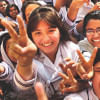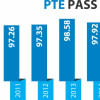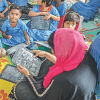Terminal exams for primary students
The guardians of students in different schools, at a human chain in the capital, have demanded that primary terminal examinations be abolished so that undue pressure on students is reduced. The parents rightly point out that students have to sit for as many as four public exams before they finish Class-XII, which means that they are caught in a perpetual cycle of exam preparation, at the cost of learning in a holistic manner. The constant pressure and stress hamper students' psychological and physical development and make them wary of learning itself; and by awarding only a small proportion of students, it dents the self-confidence of the vast majority who, despite their perseverance and hard work, do not excel in the exams.
What, we wonder, is the point of these exams at such an early stage of their life, when they may not even be able to comprehend the gravity of a comprehensive exam and compete accordingly? As researchers and educationists have noted, the tests do not really measure the students' skills and competencies, but their abilities to memorise and regurgitate certain segments of the textbook. Unfortunately, schools spend more time and energy on preparing students to answer the exam papers than on ensuring basic proficiency in reading, writing and mathematics. Worse still is the fact that students must go to private coaching centres if they are to succeed, with teachers putting little effort in teaching students during school hours as they want them to attend after-school tuition -- in violation of the set of regulations for teachers formulated in 2012 to curb unauthorised coaching.
We urge the authorities to reconsider this practice of terminal exams which seem to be hampering, rather than enabling, learning. They should engage different stakeholders, including guardians, students and educationists, to reevaluate if these exams are producing the desired results. Meanwhile, the regulations for teachers must be implemented to rein in the abhorrent practice of private coaching.

 For all latest news, follow The Daily Star's Google News channel.
For all latest news, follow The Daily Star's Google News channel. 







Comments